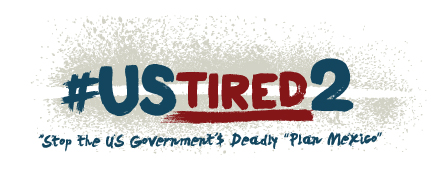[PRESS HIT] Activists plan protests in dozens of U.S. cities on Dec. 3 for missing Mexican students
Category : Press
As Mexico continues to grapple with the growing unrest in the wake of the ever-expanding scandal surrounding the disappearance of 43 college students, activists in the U.S. are taking to the streets to voice their solidarity with their southern neighbors and protest Washington’s involvement in Mexico’s bloody drug war.
Students and activists in places such as New York and San Diego have already held demonstrations and candlelight vigils as tensions in Mexico continue to build and more sordid details emerge about the disappearance of the 43 teachers college students in Guerrero. Authorities say the students died at the hand of a mayor and local police working with a drug cartel.
A group of activists in the U.S. have also organized a series of simultaneous demonstrations early next month to take place in at least 54 cities - up from the original 43 - across the country in an effort to call for an end of U.S. military funding to Mexico.
“The 43 missing students are symbolic of the deeper problems and the mass graves that the U.S. military has helped create in Mexico,” Roberto Lovato, a writer and activist who helped organized the so-called #USTired2 demonstrations to take place on Dec. 3, told Fox News Latino. The organizers of the demonstrations have also launched a social media campaign using the USTired2 hashtag to raise awareness for the Dec. 3 events on Twitter and Facebook.
In New York City, activists plan to demonstrate outside the Mexican consulate in midtown Manhattan, which in recent weeks has already seen protestors demanding accountability for the 43 missing students.
“It’s important that demonstrations like these are happening here,” Daniel R. Fernandez, acting director of the Mexican Studies Institute at CUNY told Voices of NY during an October protest. “The youth should voice their discontent and they have the tools to do it.”
Organizers in the U.S. argue that the disappearance of the 43 students is raising concerns among the estimated 33.7 million people of Mexican descent in the country.
“We’re seeing the birth of a new kind of Mexican solidarity movement,” Lovato said. “This is not just being limited to Latinos but it’s being led by Latinos and particularly Mexican-Americans.”
Activists added that while it was heartening to see the U.S. and the Organization of American States make calls for justice in the disappearance of the students, to truly make a difference the U.S. must stop supplying weapons to Mexico and helping it fund its anti-drug efforts.
“The wake-up here is because of the response to the disappearances in Mexico,” Lovato said. “We are responsible for this here in the U.S. because we’re not doing anything about this.”
Organizers of the Dec. 3 demonstrations blame much of the pervasive violence in Mexico on the weapons and funding given to Mexico under the Merida Initiative – also pejoratively known as Plan Mexico – which is a security strategy between the two countries signed in 2008 that among other things has provided $2.1 billion to Mexico to combat drug trafficking in the country. While the plan is loosely modeled after a similar effort in Colombia, many critics claim that the plan is doing more harm than good – citing widespread corruption throughout Mexico’s civil police forces and a soaring murder rate since the implementation of the initiative.
“We don’t see any benefit of Merida,” former Ciudad Juárez mayor Hector Murguía said.
“The U.S. is the biggest consumer of drugs and their aid package is not enough for us to do what they expect us to do, yet the American media is so critical of Juárez,” he added. “These people need to be more responsible and not criticize what they don’t know.”
Under former President Felipe Calderón, who declared an offensive against the drug cartels in 2006, more than 60,000 people were killed from 2006 to 2012 in the ensuing fighting. While many people hoped that current President Enrique Peña Nieto would help lower the body count, the opposite has in fact happened with almost 13,000 people being slain in drug-related violence from when he took office until through the end of July.
“Peña Nieto is not willing to confront the issue and it looks like he is neglecting the problem,” Tony Payan, the Mexico center director of the Baker Institute for Public Policy at Rice University, told Fox News Latino.
Article originally posted at Fox News Latino by Andrew O’Reilly.
Twitter: @aoreilly84
